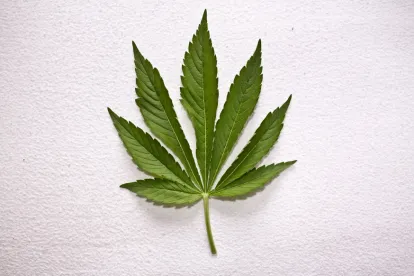Alternative dispute resolution (“ADR”) – such as mediation and arbitration – has long been an attractive alternative to litigating disputes in court, especially for parties hoping to arrive at a swift resolution. Now, given the unprecedented backlog in California courts caused by the COVID-19 pandemic, as well as uncertainty related to re-initiation of jury trials, ADR may become an increasingly favorable option – particularly for those in the cannabis industry. According to the 2019 Annual Report and Financial Statements published by American Arbitration Association (“AAA”), cannabis-related cases have seen more growth (225%) than any other category of AAA’s 9,737 business-to-business cases for that year.[i]
In California, although the cannabis industry has been deemed an “essential” business[ii] in the midst of the crushing affect that COVID-19 has had on the economy, California court closures may nevertheless bring some cannabis operations to a screeching halt. Often, the ability of cannabis businesses to operate in such a highly regulated space requires strategic partnerships with others that can provide access to critical resources such as cannabis licenses/permits, commercial real estate, or investment capital. But, what happens when a dispute arises between business partners that are dependent on one another to legally operate? Well, in the absence of a prior agreement between the parties to resolve any disputes that may arise through ADR, parties must resort to the courts for recourse. And, in the age of COVID-19, litigating disputes in court – an already slow and protracted process – just got a whole lot slower.
For instance, in Los Angeles, California, the Superior Court, beginning in March 2020, has implemented a series of measures in response to COVID-19, including court closures, continuances of all “non-essential” court proceedings – including most proceedings in connection with business disputes – for the purpose of prioritizing the adjudication of “essential” court proceedings, and limited court staff.
Given this current state of affairs, those in the cannabis business should consider including ADR provisions in any agreement they enter into with strategic partners.
Mediation
Mediation is the process by which parties to a dispute, whether or not it has developed into litigation, discuss the issues involved in the dispute with a mutually agreed upon neutral third party (the mediator) – often a retired judge or an experienced attorney – for the purpose of attempting to informally resolve the dispute. After hearing from both sides, the mediator can help the parties assess the strengths and weaknesses of their respective positions. But, like anything, mediation has its advantages and disadvantages.
Perhaps the most obvious advantage about mediation is the potential for parties to quickly resolve their disputes. Indeed, mediation can often be completed in just one day. Moreover, mediation, unlike court proceedings, is confidential and closed to the public, which can be an especially attractive attribute to parties in the cannabis industry. Mediation also allows for flexible and creative outcomes not necessarily available through judicial remedies. And, to the extent that losing negotiating leverage is a concern when contemplating the proposal of mediation, cannabis businesses should consider including mandatory mediation clauses in their business contracts – before there is any dispute – so that, in the event of a dispute, the parties are contractually obligated to come to the negotiating table before initiating litigation. In a successful mediation, parties not only save a considerable amount of time, they also save a considerable amount of money by avoiding the ever-increasing costs of litigation.
On the other hand, mediating a dispute also comes with a cost. In addition to paying for their attorneys’ fees, parties must also split the cost of the mediator, which can easily amount to a four-figure expense for each day of mediation. And, for parties for whom conducting discovery might help to facilitate settlement, mandatory mediation clauses might call for the incurrence of this expense prematurely when parties are lacking evidence that would substantiate their claims.
Nevertheless, the advantages of mediation tend to outweigh the disadvantages, and, in the long run, parties to a successful mediation will save time and money, thereby allowing the parties to get back to business quicker.
Arbitration
If, for whatever reason, an informal resolution to a dispute is infeasible, rather than resorting to the courts, cannabis businesses should consider including arbitration clauses in their contracts. Arbitration is a private process where an arbitrator – often a retired judge – rather than a judge or jury, decides the parties’ case. Arbitration may be binding (meaning parties waive their right to a trial and agree to accept the arbitrator’s decision as final) or non-binding (meaning parties are free to request a trial if they do not accept the arbitrator’s decision). Like mediation, arbitration also has its advantages and disadvantages.
Arbitration can be a great alternative to traditional litigation because it tends to be a faster. For instance, in California, under normal circumstances, it is often difficult to have a matter heard in a reasonable timeframe due to the sheer volume of cases that courts have on their dockets. As alluded to above, COVID-19 has only exacerbated this problem. Arbitrators have more bandwidth to focus their attention on a case than do most judges. Arbitration also lends itself toward a more streamlined process since the procedural requirements in arbitration are often more relaxed than in court, thus allowing parties to have the substance of their case decided more quickly. And, quicker rulings mean less time paying a lawyer to obtain a final ruling. For cannabis businesses, arbitration can be especially attractive as well because, unlike court proceedings, arbitration proceedings are generally not open to the public, nor are arbitration filings generally accessible by the public.
The most obvious negative attribute with arbitration, however, is the additional cost of paying an arbitrator’s hourly rate for everything they do in connection with a case, in additional to paying attorneys’ fees. If there is a panel of multiple arbitrators, this additional cost can add up quickly. And, while it may be quicker than litigating a dispute in court, a binding arbitration award is final and not subject to appeal, resulting in little redress for the non-prevailing party.
In most cases, however, if a speedy, cost effective, and confidential decision is the goal, arbitration is probably a better choice than going to court, especially in the age of COVID-19.
As a general matter, one of the key benefits of ADR is parties’ ability to select a neutral decision-maker – i.e., an arbitrator or a mediator, as the case may be. And, as cannabis disputes are increasingly getting resolved through ADR, there is an increasing cohort of neutrals with legal experience in the cannabis industry that sitting judges simply may not have.
The experienced lawyers, including on Sheppard Mullin’s Cannabis Industry Team, can assist cannabis and ancillary businesses in the drafting of business contracts to promote the resolution of disputes through ADR, as well as in the mediation and/or arbitration of such disputes, should they arise. Please contact the authors for more information on how we might assist on your matter.
FOOTNOTES
[i] American Arbitration Association. (2020) 2019 Annual Report And Financial Statements. https://www.adr.org/sites/default/files/document_repository/AAA_AnnualReport_2019.pdf
[ii] “Notice Regarding COVID-19 And Commercial Cannabis Business.” Bureau Of Cannabis Control, 21 March 2020, https://bcc.ca.gov/about_us/documents/media_20200321.pdf. Press release.




 />i
/>i
